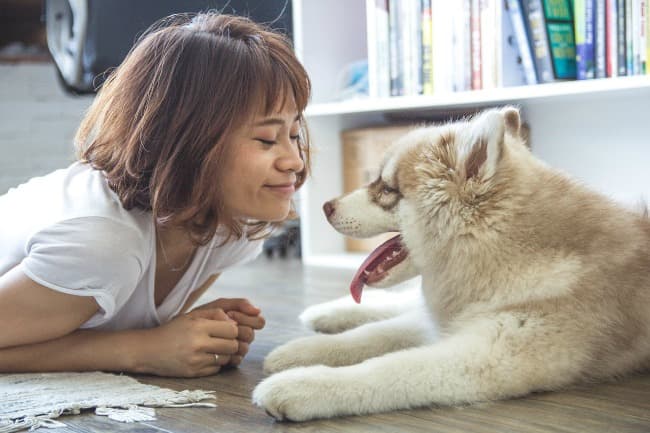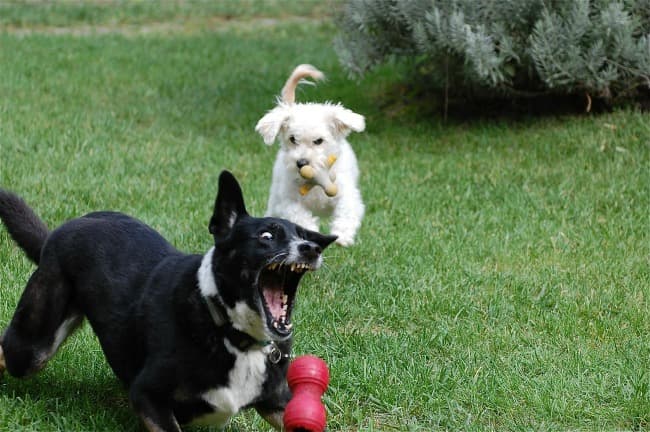FYI: If you buy something through a link on this site I may earn a commission - at NO extra cost to you.
How to Adopt A Puppy
When you choose to adopt a puppy or dog from a rescue, pound or shelter you change one life forever (or two, if you count yours as well!) for the better!
Adopting a puppy (or an adult dog) is a humane, practical and and hugely rewarding alternative to buying from a breeder/neighbor (or worse, a pet store!).
City pounds and animal shelters are bursting at the seams with homeless dogs and puppies who ended up there through no fault of their own.
In fact, according to recent pet rescue statistics compiled by the ASPCA, HSUS and the National Council on Pet Population Study & Policy, there are approximately 3.9 MILLION dogs enter shelters across the US every year.
Even worse, is that just over 30% of dogs admitted are euthanized (although this figure is improving due to better public awareness, and a nationwide push for adoption).
And all these dogs are waiting patiently for that special home..... waiting to belong to someone.... waiting for a family who will think they're special.

CLICK HERE to jump straight to info. on dog rescue organizations/groups where you can search national databases for pups/dogs that are available now.
CLICK HERE to learn more about the pros and cons of adopting an older dog, how it can be a joyful experience for everyone.
So Many Pets Waiting To Be Adopted!
Sadly, many people don't realize the amount of time, patience, energy, love and money, it takes to raise a puppy (or any pet for that matter)... and they 'bite off more than they can chew!
Unrealistic owner-expectations and 'impulse buying' is behind the suffering of way too many pets.
The end result of all this is usually that the unfortunate pet ends up being surrendered to a rescue organization, or worse - abandoned or 'dumped' and left to fend for him/herself.
Many of these sad endings could be avoided if prospective adoptive parents took the time to do some research first.
Here are the TOP 10 reasons dog owners give for surrendering their pets:
- Moving house
- Landlord problems
- Can't afford them
- Not enough time
- Unsuitable accommodation
- Too many dogs/pets
- Dog is ill
- Personal problems
- Dog has bitten someone
- No homes for a litter of puppies
According to the most recent studies there's a pretty equal split between pets being surrendered to shelters by their owners, and those being picked up by animal control. Heartbreaking.
Types Of Animal Rescue Organizations
If you're looking to adopt a puppy, dog or cat, there are a number of different types of animal shelters you can go to in your area.
- A Municipal Shelter
This type of animal rescue is usually your local City Pound, and often doubles as an Animal Control shelter and Rescue Home.
Dogs or puppies at these shelters are at the greatest risk of being euthanized and don't have much time for a reprieve!
Some cities/states may have 'no-kill' pounds, but they are few and far between. - Private or Non-Profit Shelters
These are usually much smaller and privately run. They are frequently 'no-kill shelters' but can't hold nearly as many dogs and cats as the bigger municipal centers.
In this group you can often find breed-specific rescue organizations. I was surprised to find out that approx. 25% of dogs who end up in shelters are purebred (from statistics compiled by National Council on Pet Population Study and Policy - NCPPSP.
Find out about all the different options available to you and get direct links to many of them (and the pets that are available right now) on my Dog Rescue Organizations page!
Looking to adopt a purebred puppy or dog?
There are many purebred rescue organizations across the country.
Check out the ASPCA's Rescue Network for the most comprehensive database of links to purebred dog rescue organizations and groups in the USA.
What Do You Want in a Puppy?
So now you've found the shelters and pounds in your area, and are ready to embark on your quest for the perfect pup or dog for your family.... how do you begin?

The best thing to do is to go and
take a look at each option with an open mind - and try not to pick the
first pup you see!
It will be difficult to do because there are just SO many dogs who need your help, but it's important to take your time and be sure you're making the right decision. If you don't, the happy ending you're after could be difficult to find.
Depending on the individual shelter or rescue center, the procedure to adopt a puppy or dog may vary, but in general you should expect to answer at least a handful of questions before you're allowed to take your new best friend home.
Of course, the shelter WANTS you to give one of their dogs a good home, but first they need to be sure that the homeless puppy you choose is a good 'fit' for you and your family.
Before you can adopt a dog or puppy (or cat, pocket pet etc.) they'll most likely want to know some, or all, of the things below -
- Do you rent or own your home?
- Do you have fenced yard?
- Do you have children, if so how old?
- How many hours per day will the dog, or puppy be left alone?
- Do you have other pets?
Answer honestly, it'll help the shelter staff match you up with the right puppy for your lifestyle.
You should also ASK some questions before you pick out your new best friend....
It's so easy to be captivated by the first pair of puppy-dog eyes you see that it's a good idea to make a list of 'my puppy must-haves' before you go!
Ask yourself what it is you're looking for in a dog, what things are essential, what are negotiable and what doesn't matter one bit.
A few minutes thought and preparation can help prevent you leaving with the least suitable (but of course equally adorable) puppy in the place.
For example your puppy adoption wishlist could include things like:
- Approx. adult size of dog or puppy you'd prefer. Bear mind though, that a mix breed puppy is always a bit of a gamble when it comes to size
- Long or short coat?
- Male or female?
- Temperament & energy level, eg. do you want a quiet, laid back lap dog or a high energy running partner?
It's still perfectly possible that you'll fall in love with a dog that doesn't fit your list, and that's OK as long as you're aware that you'll need to adapt your expectations or preparations to fit your new best friend.
black puppies & dogs are just as cute & lovable!
If you're looking to adopt a puppy or dog, please don't overlook those with black fur! If this sounds like a strange request, check out www.blackpearldogs.com and you'll see why I asked.
I had no idea that a black pup or dog was likely to be overlooked in favor of a lighter colored one - especially if it's BIG as well as black!
This website will touch your heart and I hope that in some small way we can help the plight of these abandoned dogs and puppies that so desperately need loving homes and families.
Color discrimination is a terrible thing in the human world, now it seems it also exists in the dog world, let's put an end to that.... now!
Let The Shelter Staff Help You
The staff at the rescue center can help you adopt a puppy or dog that is right for you.
They will probably have a basic knowledge of each
individual animal, private shelters often have fewer dogs and more time
to spend with them so may have more information available.
But even busy, over-crowded City Pounds are staffed by caring people who take the time and trouble to get to know each homeless dog or puppy and have the dog's best interests at heart.
Before you adopt a puppy it's a good idea to ask about the following things for each rescue dog you're interested in -
- Personality
This is obviously easier to determine in adolescent or mature dogs, puppies can be more of an unknown quantity. In general, look for a friendly, playful pooch (not one who seems hyperactive or is cowering in a corner).
If you can find out something about a homeless puppy's parents or heritage it helps because individual breeds have different personality traits and and inborn characteristics (see my Dog Breed Information page for more on this). Some of this you can expect to show up in even mix breed pups. In your search, be very wary of any dog showing signs of aggression, and a puppy should never growl or snap.
- Energy level
It's usually best not to adopt a puppy who resembles the Energizer Bunny with ADHD or the one that refuses to even get up (unless you want to be on the go 24/7 or intend to carry your new pet everywhere!). On a serious note, a puppy who seems listless and disinterested in his surroundings could be sick, or getting that way so be careful there.
- General health
Find out if the puppy or dog you're interested in had any health problems when admitted to the shelter. If so, what was wrong and what treatment was given? Is follow-up care needed?
Most shelter animals receive routine vaccinations and are spayed or neutered before being re-homed. When looking to adopt a dog double check to be sure that this is the case with your pup.
- Social skills
If you're interested in an adolescent or adult dog ask if they are housebroken, socialized or have any basic obedience training.
Some are and some aren't, it may not be a huge deal to you either way but before you adopt a puppy it's a good idea to know what to expect, that way you're prepared.
Picking The Perfect Pup
Now you've narrowed it down to one (or maybe several) puppies, ask if you can spend some one-on-one time with the ones you're interested in.

Most
shelters have special rooms or designated areas just for his purpose.
If all goes well go ahead and introduce the rest of the family.
It can be a good idea for the whole family to go together when choosing to adopt a puppy, or dog.
You often don't know too many details about the background of rescue dogs and, for whatever reason, some shelter dogs may be great with women and children but terrified of men.
Or they may be quite comfortable with adults but very nervous around the quick movements and high pitched voices of children It's best to find this out sooner rather than later.
Ask the shelter if they have offer 'trial' or 'grace' periods where you can take an animal home for a couple of days, or a weekend, to make sure it's a good 'fit' before you officially adopt him or her.
Even if they don't, many organizations are more than willing to take back any dog/pup who doesn't work out, rather than have them homeless again.
If you're looking for a family dog, you'll find all the tips and advice you need on these pages.....
Congratulations you're quest to adopt a puppy is now officially over!
The dog you've chosen is one of the lucky ones, and you've given him the chance of a happy life..... but what's next?
After Adoption - Bringing Puppy Home
I know it took a little bit of time, thought and effort but it was worth it wasn't it? You've chosen the perfect puppy to adopt, signed the papers and you're all ready to go home.
If this is your first puppy or dog you've probably got a lot of questions mixed in with all that excitement!
Raising a pup takes time, effort, love, patience and money (underestimating that may be what led to your new best friend finding himself in need of adoption in the first place!), so let's get you organized...
Your new pup should have had all his age appropriate vaccinations and parasite prevention treatments and have been spayed or neutered. That is a huge step in the right direction, and now it's just up to you to keep him happy and healthy.
Check out these pages to get all the tips, advice and information you need:
Your new puppy may (or may not) be house-trained and it's important to start off the right way as soon as you get him home.
He will most likely be used to a crate and I strongly recommend crate training a puppy - or a dog of any age for that matter, the principles are the same regardless.
If your new family member is a mixed breed dog (and chances are good that he is), then you might be interested in finding out more about his family tree. Apart from the curiosity factor, there are very good reasons for learning as much as you can about your dog's genetic background.
Check out my Dog DNA Testing page to learn more about these and find out how you can get the info. you need.
I always find that having a couple of good books to turn to helps whatever the situation may be!
Here are a few that I recommend you
take a look at if you're thinking about adding an adopted puppy or dog to your family.....
They contain lots of practical tips and advice that will help you take the very best care of your new best friend.
Adopted pets seem to just KNOW that they've been given a second chance and the bond between you will be a very special, and rewarding, one.
I wish you both all the luck in the world!
you might also like...
- Home
- Choosing A Puppy
- Adopt a Puppy
FTC Disclosure: Some pages on this site contain affiliate links. I may earn on qualified purchases.











